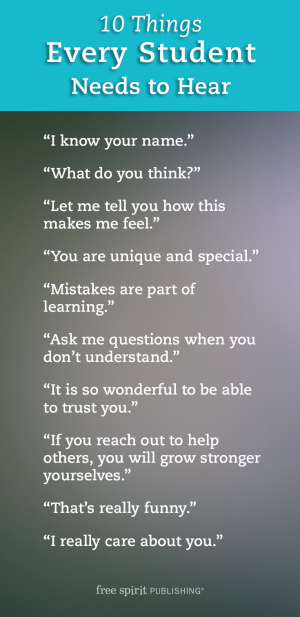 When I returned to teaching after taking a 20-year hiatus to raise my own children, I had an opportunity to take over a sixth-grade class during the last six weeks of school. When first entering the room, I dodged ricocheting spitballs—not a prime situation for success. I knew I needed a strategy fast.
When I returned to teaching after taking a 20-year hiatus to raise my own children, I had an opportunity to take over a sixth-grade class during the last six weeks of school. When first entering the room, I dodged ricocheting spitballs—not a prime situation for success. I knew I needed a strategy fast.
I thought if I focused my attention on what students needed rather than what I wanted, I might be able to create some learning conditions out of the chaos. Here are 10 things that students need to hear from their teachers to help them grow:
- “I know your name.” I conducted a crash course, memorizing each first name during the first half hour. Suddenly, I had a connection to them. They could no longer hide behind an anonymous shadow.
- “How are you doing?” “What do you think?” “Why do you feel that way?” I wrote down the personal interests and responses of each student and praised them for their good ideas.
- “Let me tell you how this makes me feel.” I told them my limits, mistakes, and goals. I asked for their help and we became a team.
- “You are unique and special.” I held personal interviews with each student for about five minutes—during seatwork, before and after class, and during recess. I had begun to recognize strengths in each of them and told them what I thought were their special talents. These sincere compliments did more to build rapport than any other strategy I used.
 “Mistakes are a part of learning.” When I let students hear that it is safe to make mistakes, they felt more secure trying difficult concepts. Everyone makes mistakes, and that is how we learn. As Edwin Louis Cole said, “You don’t drown by falling in the water; you drown by staying there.”
“Mistakes are a part of learning.” When I let students hear that it is safe to make mistakes, they felt more secure trying difficult concepts. Everyone makes mistakes, and that is how we learn. As Edwin Louis Cole said, “You don’t drown by falling in the water; you drown by staying there.”- “Ask me questions when you don’t understand.” Ann Jackman, a gifted teacher, says to her students, “Questions are the only pathway to your full understanding.”
- “It is so wonderful to be able to trust you.” I added, “Of course, trust is not bestowed, it is earned.” If I left the room for five minutes and the students stayed on task, I praised them. “It is wonderful to have such trustworthy students.” There were rough patches, but trust was the cement that held us together.
- “If you reach out to help others, you will grow stronger yourselves.” I have always involved students in real-life problem solving. It creates unity, builds self-confidence and leadership skills, and improves their learning and participation in school.
- “That’s really funny.” I tried to keep a good sense of humor. I reminded myself to laugh and enjoy them. I would say something like, “Today is a great day. We only have a half-day of school.” Amid the cheers I would add, “Half a day this morning—and half a day this afternoon.” (Booing and laughter.)
- “I really care about you.” Besides verbal reinforcement, I wrote personal, complimentary notes to each student. As the weeks progressed, instead of dodging spitballs, students wrote kind words and expressions of love to me on the board.
